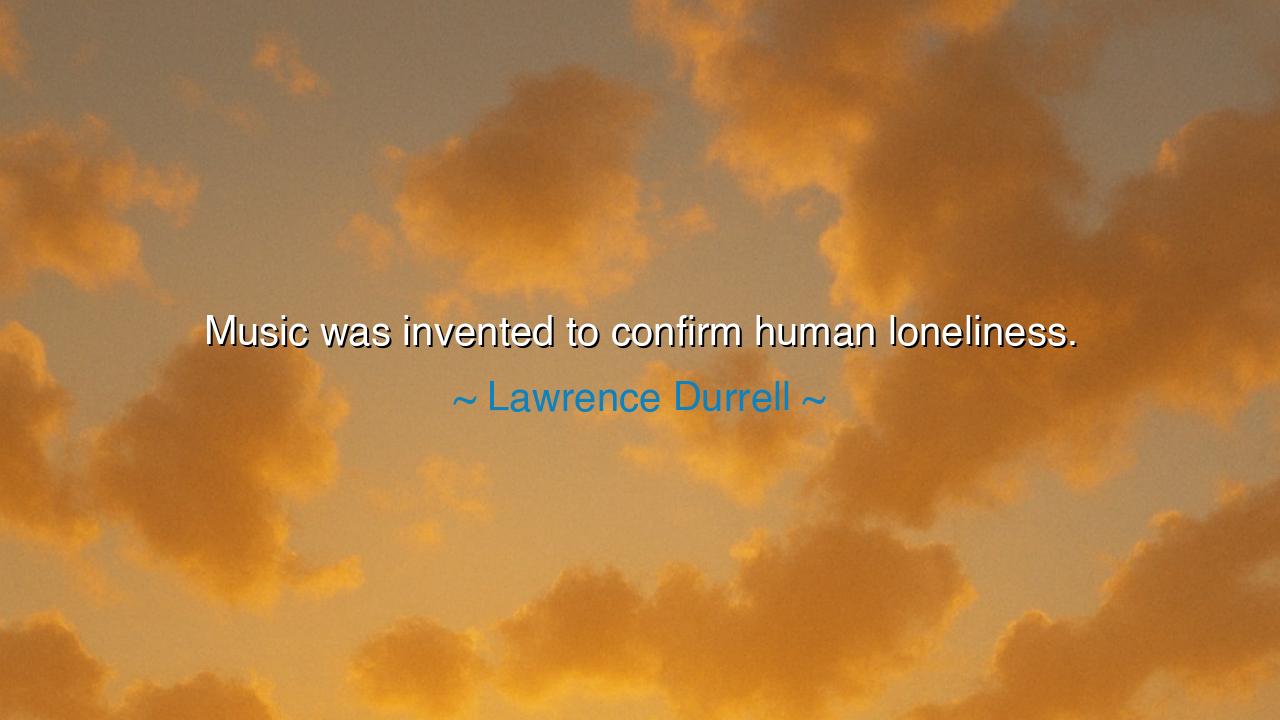
Music was invented to confirm human loneliness.






“Music was invented to confirm human loneliness.” Thus spoke Lawrence Durrell, poet of the soul, wanderer of the inner deserts, and seeker of truths often hidden in the shadows of existence. His words strike with both sorrow and beauty, for they remind us that music, though filled with harmony, springs from the ancient ache of isolation that dwells in every human heart. It is the cry of Adam in the garden when he first knew himself alone, the sigh of the traveler who looks upon the vast stars and feels his smallness. Music, then, is not born from abundance, but from the hunger of the spirit to speak what words cannot bear.
The origin of this saying lies in the paradox of the human condition. Man is surrounded by voices, yet remains solitary in the depth of his soul. The heart carries secrets no other can fully know, burdens no other can fully share. Out of this solitude arises song, the bridge between one heart and another. To “confirm loneliness” does not mean to glorify despair, but to acknowledge it—to give shape to the silence, to turn emptiness into sound. In doing so, music comforts, not by denying loneliness, but by revealing that it is universal.
Consider the story of Beethoven, who in his later years was struck deaf. No sound of applause, no murmur of friend, no whisper of nature could reach him. His was a loneliness beyond measure, a prison of silence. And yet, from that silence came his Ninth Symphony, with its soaring “Ode to Joy.” What is this if not proof of Durrell’s truth? Out of the deepest solitude, Beethoven confirmed his own isolation—and yet in the act of expressing it, he gave voice to the whole world, so that men and women across centuries might know that their loneliness, too, could sing.
History itself is shaped by this duality of isolation and expression. The spirituals of enslaved peoples in America were born from chains, pain, and the loneliness of exile. They sang not because they were full, but because they were empty; not because they were free, but because they longed for freedom. And in their singing, they confirmed their sorrow—but also connected with one another, creating solidarity that no oppressor could silence. Thus, what began as loneliness became the seed of strength, carried in melody.
Durrell’s wisdom calls us, then, to look upon our own lives. Each of us carries loneliness—some confess it, others hide it—but none escape it. To deny it is to deepen it; to express it is to heal it. Music is the chosen vessel of this healing. Whether you sing aloud, or listen in stillness, you partake in the great truth that you are not alone in being alone. The ancients knew this when they raised hymns to their gods; lovers know it when they sing of heartbreak; even children know it when they hum in the dark.
The lesson is clear: do not be ashamed of your loneliness. Instead, transform it. Let it become a song, a prayer, a poem, a note upon the strings of your life. Create, even if your voice shakes. Listen, even if the song brings tears. For through music, your solitude finds recognition, and in that recognition, it softens, it lightens, it joins the universal chorus of humankind.
Therefore, let each person take this action: invite music into the daily rhythm of life. When you are joyful, sing, and your joy will double. When you are sorrowful, sing, and your sorrow will lessen. When you feel lost, let music remind you that others, too, have wandered and sung. By doing this, you will discover that loneliness, once feared as a curse, is in truth the wellspring of connection, for it is the silence that makes song necessary.
So let Durrell’s words echo: “Music was invented to confirm human loneliness.” They are not a sentence of despair, but a revelation of hope. For though loneliness is our portion, music is our answer—proof that even in the silence of the soul, we are never truly without a voice, nor without the chance to be heard.






AAdministratorAdministrator
Welcome, honored guests. Please leave a comment, we will respond soon